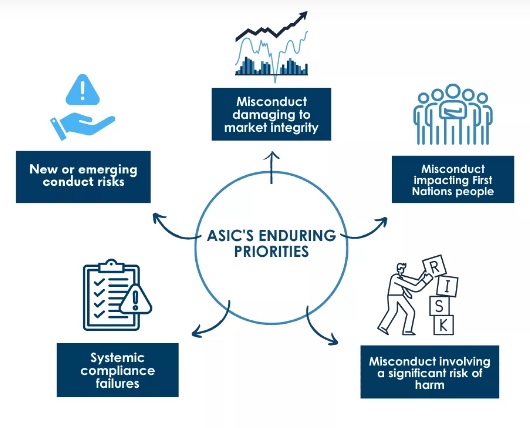ASIC's 2023 enforcement priorities show a continued focus on greenwashing and predatory lending, and interrupting investment scams. The release of the enforcement priorities aims to show industry and consumers where ASIC will focus its resources, both human and financial, over the coming year.
For 2023, ASIC's enforcement priorities are:
- Enforcement action targeting poor design, pricing and distribution of financial products
- Misleading conduct in relation to sustainable finance, including greenwashing
- Misconduct involving high risk products including crypto assets
- Combating and disrupting investment scams, with a focus on crypto assets and scams and other high-risk products
- Protecting financially vulnerable consumers, especially in relation to predatory lending or high-cost credit
- Misleading and deceptive conduct relating to investment products
- Misconduct in the superannuation sector
- Failures by providers of general insurance, particularly in relation to delivering on price promises
- Misconduct that involves misinformation through social media Governance and director's duties failures, with a focus on property schemes
- Manipulation in energy and commodities derivatives markets
- Unfair contract terms
These priorities are underpinned by ASIC's enduring priorities, which underpin and guide the focus areas from year to year. The 5 enduring priorities are:
- Misconduct damaging to market integrity including insider trading, continuous disclosure failures and market manipulation
- Misconduct impacting First Nations people
- Misconduct involving a high risk of significant consumer harm, particularly conduct targeting financially vulnerable consumers
- Systemic compliance failures by large financial institutions resulting in widespread consumer harm
- New or emerging conduct risks within the financial system

What does this mean for licensees?
Licensees should take note of ASIC's 2023 enforcement priorities, particularly those that affect the licensees operations. One key area where we have already seen ASIC take action is in relation to compliance with the Design and Distribution (DDO) regime. ASIC has acted to place stop orders on a number of financial firms in response to deficiencies in their Target Market Determinations (TMDs). Licensees that are required to comply with the DDO regime must ensure they have:
- Appropriate product governance arrangements in place;
- Update product governance arrangements on an ongoing basis, and in response to any significant dealings or complaints;
- Proper consideration of the target market and the attributes of the product;
- Review and make any required amendments to TMDs;
- Ensure appropriate distribution of product, including by liaising closely with distributors to ensure significant dealings and complaints are appropriately responded to
Misleading and deceptive conduct is also a key enforcement focus for ASIC. Whilst ASIC has specifically called credit, sustainable finance and superannuation products as important areas of focus, all licensees can take action to ensure they do not provide information or engage in conduct which is misleading or deceptive. Small actions such as:
- Reviewing marketing material prior to release against ASIC's good practice guidance in Regulatory Guide 234;
- Training representatives to ensure they understand the products and services the licensee is authorised to provide;
- Ensuring the risks and benefits of a product are appropriately and adequately disclosed to consumers;
- Ensure claims of sustainability or performance can be substantiated.
Further Reading
DDO Enforcement - ASIC issue first DDO stop orders
